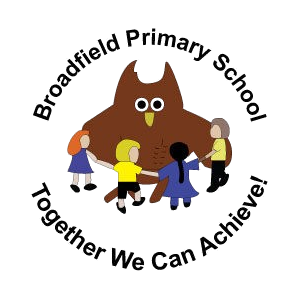Science
Click here to see the overview for Science 2024-2026
Intent - Our Aims
Our intent is to provide opportunities for children to develop as confident, articulate and well-rounded children who can succeed as individuals and contribute to their community and the wider world.
We believe science encompasses the acquisition of knowledge, concepts, skills and positive attitudes and understand that it is important for lessons to have a skills-based focus, and that the knowledge can be taught through this.
At Broadfield Primary School we aim to:
- Ensure that all children can develop scientific knowledge and conceptual understanding through the specific disciplines of Biology, Chemistry and Physics
- Develop children’s understanding of nature, processes and methods of science through different types of science enquiries, enabling them to answer scientific questions about the world around them
- Equip children with the scientific skills required to understand the uses and implications of science, today and for the future.
- Encourage children to be inquisitive
- Ensure that throughout the programmes of study, children will acquire and develop the key knowledge that has been identified within each unit and across each year group and that they will be able to apply scientific skills
- Ensure that the ‘working scientifically’ skills are built-on and developed so that children can apply their knowledge of science when using equipment; conducting experiments; building arguments; explaining concepts confidently; and as a consequence of this continue to ask questions and be curious about their surroundings.
Implementation - How Will We Do This
Within the Broadfield curriculum science can be an ‘enquiry driver’ or a stand alone topic and is taught weekly.
Teachers create a positive attitude to science learning within their classrooms and reinforce an expectation that all children are capable of achieving high standards in science.
Our whole school approach to the teaching and learning of science involves the following:
- Creation of engaging lessons
- Planned problem solving opportunities where children are able to ask their own questions and use their scientific and research skills to discover the answers
- Provision of high-quality resources, working walls and displays to aid understanding of conceptual knowledge
- Precise questioning to assess conceptual knowledge and skills
- Direct teaching of new or subject specific vocabulary and challenging concepts
- Embedding ‘working scientifically’ into lessons to ensure these skills are being developed throughout primary school including demonstration of how to use scientific equipment
- Regular assessments to identify gaps in children’s learning and adapt planning appropriately. Assessment is both formative, through questioning and effective feedback; and summative, across a two year cycle where the children focus on key concepts in science.
- Carefully chosen prerequisite and ‘in unit’ learning and assessment tasks which enable children to develop and retain knowledge across a range of topics, build on key concepts and make links year by year.
- Planned opportunities for our children to develop their learning beyond the classroom. These may be: in the outdoors; workshops with experts; participating in National initiatives, e.g. Earth Day or educational visits
- Events such as Science Week or topical science project days. These events often involve families and the wider community.
- Extra curricular activities such as a science club for those children who are demonstrating an aptitude for, or a particular interest in, science.
Early Years Foundation Stage - EYFS
Children are encouraged to understand the world around them through key scientific themes such as: materials, living things, different environments and countries, natural phenomena and how things work through exploring different processes.
By engaging the children in science using the above themes they begin to develop the scientific enquiry skills of observing, comparing, classifying, measuring, communicating, inferring and predicting. This gives children the foundations they need as scientists to build on as they move up into KS1 and KS2.
Key Stage 2
Children in Key Stage 2 attend sessions at the Science Centre at Oldham Sixth Form College where they are able to develop their knowledge and skills within a laboratory setting. These sessions are carefully linked with learning in class. They also provide an insight as to what can be expected in science lessons at high school.
Impact
Children at Broadfield overwhelmingly enjoy science and are motivated learners with sound scientific understanding.
Science is a strength across the school and this is backed up by the end of Key stage 2 teacher assessments which are consistently in line with National standards.
Children understand how science has changed our lives, the impact that humans are having on our planet, and what we can do to protect it.
As the children’s knowledge and understanding increases, and they become more proficient in selecting and using scientific equipment, collating and interpreting results, they become increasingly confident in their growing ability to come to conclusions based on real evidence.
Children are able to talk about a range of scientists and have an awareness of scientific career opportunities.
In addition, our community links and connection with national agencies such as: the STEM association, Ogden Trust, Mad Science and Oldham Sixth Form College enable the children to learn from and work with professionals, whilst ensuring that children have access to positive role models within the field of science from the immediate and wider local community for example Professor Brian Cox.
